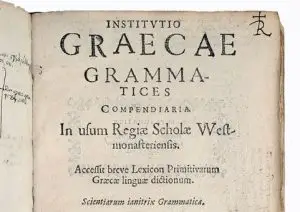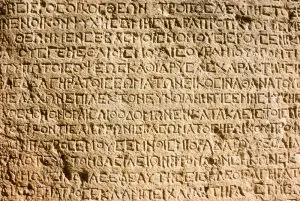Is the Holy Spirit a person or the power of God? A “He” or an “it?” According to Trinitarians, the Holy Spirit is a separate person, distinct from the Father and the Son. The main evidence presented as “proof” that the Spirit is more than just a divine power or force is the use of masculine pronouns found primarily in John’s gospel. What most people don’t realize, however, is that these pronouns cannot be used to determine the natural gender[1] of the Spirit, as we shall see.
Gender Assignment
Approximately one-quarter of the world’s languages, including most of the modern Romance languages, have what is called grammatical gender, where a noun is arbitrarily assigned a gender–masculine, feminine, or the impersonal, neuter– without regard to the noun.[2] For example, in Spanish, the word table is la mesa. La tells the reader that table has been assigned a feminine gender, even though it is an impersonal object. Book, on the other hand, is el libro. El let’s us know the book has been assigned a masculine gender. When translating these words into English, we would never refer to the table as “she” or the book as “he” because English does not have grammatical gender. Instead, we would use the impersonal or neuter pronoun, “it.”[3] Thus, grammatical gender does not always reflect the natural gender (sex) of a noun.
 Like Spanish, the Hebrew and Greek languages both use grammatical gender. For example, the word for spirit in Greek is pneuma, and it means wind, breath, spirit.[4] Pneuma has been assigned the neuter gender, meaning that the corresponding pronouns in Greek, and when translating it into English, are it and which. However, many Bible translators ignore standard translation rules and substitute the personal pronoun he for the impersonal pronoun it, despite the fact that the assigned grammatical gender is not masculine. For example:
Like Spanish, the Hebrew and Greek languages both use grammatical gender. For example, the word for spirit in Greek is pneuma, and it means wind, breath, spirit.[4] Pneuma has been assigned the neuter gender, meaning that the corresponding pronouns in Greek, and when translating it into English, are it and which. However, many Bible translators ignore standard translation rules and substitute the personal pronoun he for the impersonal pronoun it, despite the fact that the assigned grammatical gender is not masculine. For example:
John 1:32 (NASB) John testified saying, “I have seen the Spirit [pneuma; neuter gender] descending as a dove out of heaven, and He remained upon Him [Jesus]. (emphasis added)
Many translations, like the one above, assign a masculine pronoun to the neuter pneuma or spirit and capitalize it to give the reader the impression that the Spirit is a person. Instead of “it remained on Him,” the text is changed to read, “He remained upon Him.” Thankfully, many translations correctly render Spirit (pneuma) in John 1:32 as an “it” in keeping with its neuter gender.[5] For example:
English Standard Version – And John bore witness: “I saw the Spirit [pneuma; neuter gender] descend from heaven like a dove, and it remained on him. (emphasis added)
Young’s Literal Translation – And John testified, saying — ‘I have seen the Spirit [pneuma; neuter gender] coming down, as a dove, out of heaven, and it remained on him (emphasis added)[6]
Moreover, many other translations simply drop the pronoun all together. [7] For example:
New International Version – Then John gave this testimony: “I saw the Spirit [pneuma; neuter gender] come down from heaven as a dove and remain on him.” (emphasis added)
Berean Study Bible – Then John testified, “I saw the Spirit [pneuma; neuter gender] descending from heaven like a dove and resting on Him.” (emphasis added)
Almost all of the major translations, however, change the text to reflect a masculine pronoun when the Spirit is spoken of in Jesus’ upper room discourse.[8] It’s here that Jesus informs his disciples that the hour of his departure is at hand[9] but that he will not leave them alone:
John 14:16-17 (NASB) “I will ask the Father, and He will give you another Helper, that He may be with you forever; 17 that is the Spirit [pneuma; neuter gender] of truth, whom the world cannot receive, because it does not see Him or know Him, but you know Him because He abides with you and will be in you. (emphasis added)
The masculine pronouns He and Him that appear in bold in this passage conflict with the neuter noun, pneuma or Spirit. As we’ve learned, because the noun is neuter, the pronoun it would be the proper translation, not He or Him.[10] Unfortunately, the translators have altered the text by inserting masculine pronouns. This altered passage, and four others like it (John 14:25-26; 15:26; 16:7-8, 13-15), are in turn, offered by unsuspecting Bible readers as the primary evidence that “proves” the Holy Spirit is a person.
The Spirit as the Helper or Paraklêtos
 Some look to other so-called grammatical evidence within these Johannine passages to prove the personhood of the Holy Spirit. This evidence is found in Jesus’ reference to the Holy Spirit as the Helper:
Some look to other so-called grammatical evidence within these Johannine passages to prove the personhood of the Holy Spirit. This evidence is found in Jesus’ reference to the Holy Spirit as the Helper:
John 14:25-26 (NASB) “These things I have spoken to you while abiding with you. 26 “But the Helper, the Holy Spirit, whom the Father will send in My name, He will teach you all things, and bring to your remembrance all that I said to you. (emphasis added)
Helper, which is paraklêtos in the Greek, means someone who is “called to one’s side,” and it is translated as advocate, intercessor, comforter, helper.[11] Paraklêtos or Helper is assigned the masculine grammatical gender with the corresponding pronouns he, his, who, etc. This is offered as justification for translating the Spirit as He. However, as we’ve seen in our previous examples of table and book, grammatical gender does not determine the natural gender (sex) of a noun. Nevertheless, translators removed the neuter pronouns associated with the Holy Spirit and replaced them with the masculine pronouns related to Helper. But Helper is a word that is used of the Spirit a mere four times[12] compared to the over 200 times Spirit is used.[13] Moreover, Helper is descriptive of the Spirit’s function, not an indicator of a personality.
That grammatical gender cannot be used to determine a noun’s natural gender is especially true in the case of the Holy Spirit. If translators were to apply their divergent translation practices regarding the Spirit to the Old Testament, they would have to render the Spirit of God a female. That’s because the word for spirit in Hebrew is ruach, and it has been assigned the feminine gender along with corresponding feminine pronouns, she, her, etc. But translators don’t make the grammatical mistake of calling the Holy Spirit a She. Why then do most translators refer to the Holy Spirit using masculine pronouns when it is feminine in the Old Testament and neuter in the New Testament? It would appear to be a biased effort on their part to strengthen the fourth century doctrine that the Spirit is a person and a member of the Trinity.
Neuter Nouns Are Impersonal Things
Translators cannot escape the fact, however, that in the Greek, neuter nouns require neuter pronouns that should not be translated as personal pronouns. Professor Jason BeDuhn explains:

Now it turns out that both “masculine” and “feminine” Greek nouns can be used for impersonal things as well as persons. But “neuter” nouns are used only for impersonal things, such as objects, animals, forces, abstract principles, and so on. …the “Holy Spirit” is referred to by a “neuter” noun in Greek. Consequently, it is never spoken of with personal pronouns in Greek. It is a “which,” not a “who.” It is an “it,” not a “he.” This is the case, then, where the importance of the principle of following primary, ordinary, generally recognized meaning of the Greek when translating becomes clear. To take a word that everywhere else would be translated “which” or “that,” and arbitrarily change it to “who” or “whom” when it happens to be used of “the holy spirit,” is a kind of special pleading. In other words, it is a biased way to translate. And because this arbitrary change cannot be justified linguistically, it is also inaccurate.[14] (emphasis added)
Pastor and author Charles Morgridge is in agreement:
The Greek word pneuma, which is translated Spirit and Ghost in the New Testament, and the pronouns standing for it are of the neuter gender and consequently impersonal. A neuter noun is not used to express the proper name of a person, nor is a neuter pronoun used instead of a personal pronoun.[15] (emphasis added)
In other words, since Spirit is a neuter noun in the Greek, it cannot be a person because neuter nouns are used only for impersonal things. By ignoring the neuter pronoun and calling the Spirit a He, the translators have revealed their bias and, according to BeDuhn, created an inaccurate translation. Unfortunately, the unsuspecting reader is oblivious to the obfuscation that has occurred behind the scenes.
Thankfully, there are some Bible versions that respect the grammatical rules governing the translation of the Spirit. Compare the NASB, which altars the grammar, with the Contemporary English Version and A Faithful Version which do not:
John 16:7 (NASB) “But I tell you the truth, it is to your advantage that I go away; for if I do not go away, the Helper will not come to you; but if I go, I will send Him to you. (emphasis added)
John 16:7 (CEV) But I tell you I am going to do what is best for you. This is why I am going away. The Holy Spirit cannot come to help you until I leave. But after I am gone, I will send the Spirit to you. (emphasis added)
John 16:7 (AFV) But I am telling you the truth. It is profitable for you that I go away because if I do not go away, the Comforter will not come to you. However, if I go, I will send it to you. (emphasis added)
Capitalization of Holy Spirit
 Some may still attempt to argue that the Holy Spirit is a person because the words holy and spirit are capitalized.[16] The Greek New Testament, however, was written in all capital letters without punctuation and spacing between words. Thus, the decision to capitalize a word is taken from textual clues. It is up to the translator to determine if the noun in question is a proper noun. What we have discovered in this instance is that the neuter noun, Spirit, is indicative of a thing and does not require capitalization. Nevertheless, it is important to note that some Christians choose to capitalize Holy Spirit, not from a belief that the Spirit is a person, but to show respect for the things of God.
Some may still attempt to argue that the Holy Spirit is a person because the words holy and spirit are capitalized.[16] The Greek New Testament, however, was written in all capital letters without punctuation and spacing between words. Thus, the decision to capitalize a word is taken from textual clues. It is up to the translator to determine if the noun in question is a proper noun. What we have discovered in this instance is that the neuter noun, Spirit, is indicative of a thing and does not require capitalization. Nevertheless, it is important to note that some Christians choose to capitalize Holy Spirit, not from a belief that the Spirit is a person, but to show respect for the things of God.
What is the Holy Spirit?
What then is the Spirit, if not a person? According to Scripture, the Holy Spirit is the Spirit of God the Father. We see this exemplified when terms like the Spirit of your Father, the Spirit of God, the Holy Spirit, and the Spirit are used synonymously. (You can read about this in more detail here.) For example:
Matthew 10:19-20 (NASB) “But when they hand you over, do not worry about how or what you are to say; for it will be given you in that hour what you are to say. 20 “For it is not you who speak, but it is the Spirit of your Father who speaks in you. (emphasis added)
Mark 13:11 (NASB) “When they arrest you and hand you over, do not worry beforehand about what you are to say, but say whatever is given you in that hour; for it is not you who speak, but it is the Holy Spirit. (emphasis added)

Matthew refers to the Spirit as the Spirit of your Father, while Mark’s parallel passage refers to it as the Holy Spirit. Indeed, the Holy Spirit is the Spirit of God, not a separate person from God:
Isaiah 63:10 (NASB) But they rebelled and grieved His Holy Spirit; Therefore He (Yahweh) turned Himself to become their enemy, He fought against them.[17] (emphasis added)
Ephesians 4:30 (NASB) Do not grieve the Holy Spirit of God, by whom you were sealed for the day of redemption. (emphasis added)
1 Thessalonians 4:8 (NASB) So, he who rejects this is not rejecting man but the God who gives His Holy Spirit to you. (emphasis added)
It is not surprising then that the Dictionary of Judaism in the Biblical Period defines the Spirit as God’s presence and power:
Just as “spirit” was considered the essence of human life, so analogously the term “spirit” was used of the presence, activity, and power of God, that is, characteristics that demonstrate that God is truly a “living God.”[18] (emphasis added)
In a future post, we’ll see how, after the ascension of Jesus, the Holy Spirit becomes the vehicle, if you will, for Christ’s presence in the earth.
Do the masculine pronouns used of the Holy Spirit, especially in John’s gospel, prove the Spirit is a person? Not according to the grammar, as Biblical scholar Daniel Wallace reports:
There is no text in the NT that clearly or even probably affirms the personality of the Holy Spirit through the route of Greek grammar….the grammatical basis for the Holy Spirit’s personality is lacking in the New Testament, yet this is frequently, if not usually, the first line of defense of the doctrine of many evangelical writers. But if grammar cannot legitimately be used to support the Spirit’s personality, then perhaps we need to reexamine the rest of our basis for this theological commitment. [19] (emphasis added)
Indeed, we must decide if we will align our views with orthodoxy and refer to the Holy Spirit as a person, regardless of the grammar. Or if we will believe what the Bible actually says about the Spirit of God.
[1] Natural or sexual gender refers to whether or not someone or something is male or female. The natural gender for an inanimate or impersonal object is considered neuter. Natural gender differs from grammatical gender as described in the next paragraph.
[2] https://en.wikipedia.org/wiki/Grammatical_gender
[3] An exception might be in the case of personification, where an impersonal object is spoken of in terms of a masculine or feminine persona. For example, the ship in Henry Van Dyke’s poem, Gone From My Sight, is personified as a woman: “I am standing upon the seashore. A ship, at my side, spreads her white sails to the moving breeze and starts for the blue ocean. She is an object of beauty and strength.” https://allpoetry.com/Gone-From-My-Sight
[4] Strong’s Concordance, #4151.
[5] Some of the versions that translate pneuma as “it”: King James Version; Berean Literal Bible; International Standard Version, Revised Standard Version, American Standard Version, English Revised Version, Webster’s Bible, Weymouth New Testament, World English Bible, NET Bible, New Heart English Bible, Jubilee Bible, Darby Bible
[6] Some may assert that “it” in the ESV and YLT translations refers to the dove. But dove in Greek is peristera which carries a feminine grammatical gender and carries with it the corresponding pronoun “she.”
[7] Some of the versions that drop the pronoun altogether: Complete Jewish Bible, J.B. Phillips Translation, Geneva Bible of 1599, New Living Translation, Contemporary English Version, Good News Translation, Aramaic Bible in Plain English, God’s Word Translation, One God, One Messiah Translation, New Living Translation, Tyndale Bible, Lexham Bible.
[8] The discourse is from John 13-17, but the passages, in particular, are John 14:16-17, 25-26; 15:26; 16:7-8, 13-15.
[9] John 13:1. See Did Jesus “Return” to the Father? for commentary on John 13:3.
[10] Here are other examples where the KJV appropriately uses neuter pronouns for pneuma or Spirit: Matthew 10:20; John 1:32; Romans 8:16 and 26.
[11] Strong’s Concordance, #3875.
[12] John 14:16, 26; 15:26; 16:7.
[13] Includes, Spirit, Holy Spirit, Spirit of God, etc.
[14] Jason David BeDuhn, Truth in Translation, (University Press of America, 2003), p. 140.
[15] Charles Morgridge, True Believer’s Defence [sic] Against Charges Preferred by Trinitarians For Not Believing in the Divinity of Christ, The Deity of Christ, the Trinity, (New Bedford, 1837), p. 148.
[16] Another key passage where translators misappropriate pronouns and capitalization is found in John 1:1-3.
[17] The context here is refers to Yahweh; see verse 7. See also Isaiah 63:11 and Psalm 51:11.
[18] Jacob Neusner, William Scott Green (ed.), Dictionary of Judaism in the Biblical Period (Peabody: Hendrickson Publishers, 1996), p. 298.
[19] Daniel Wallace, “Greek Grammar and Personality of the Holy Spirit,” Bulletin for Biblical Research, 13.1 (2003), p. 97-125.




